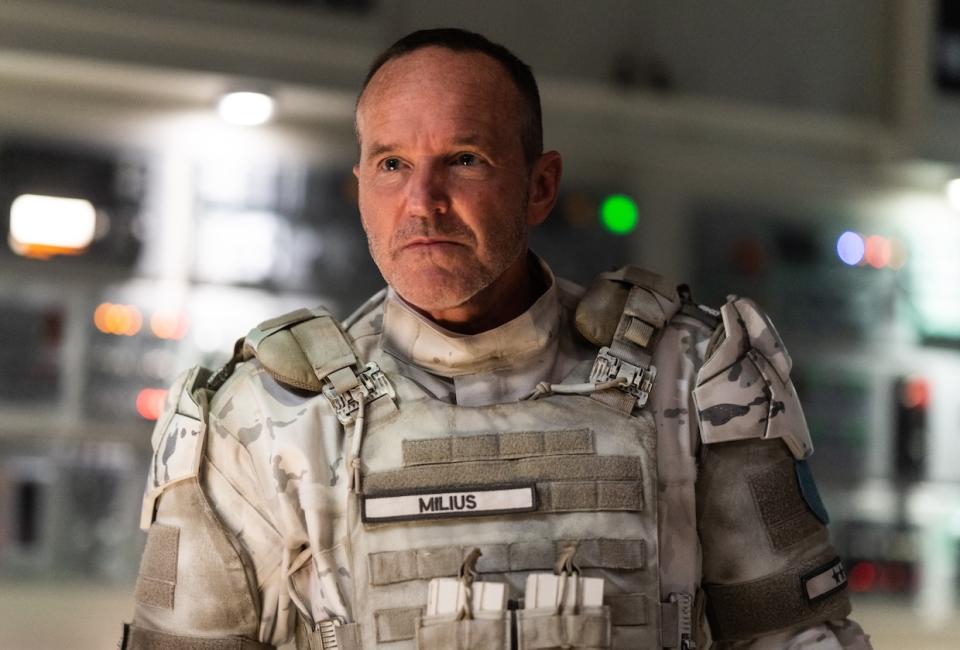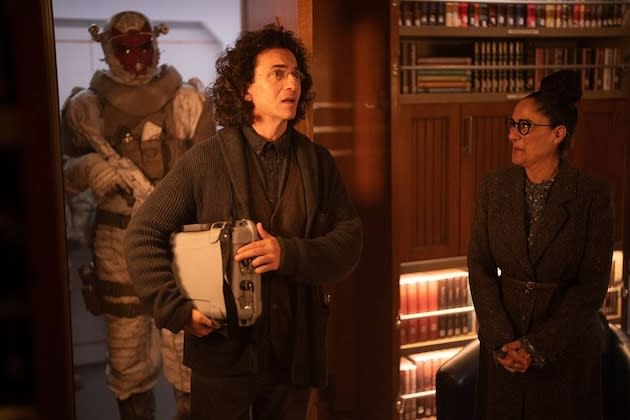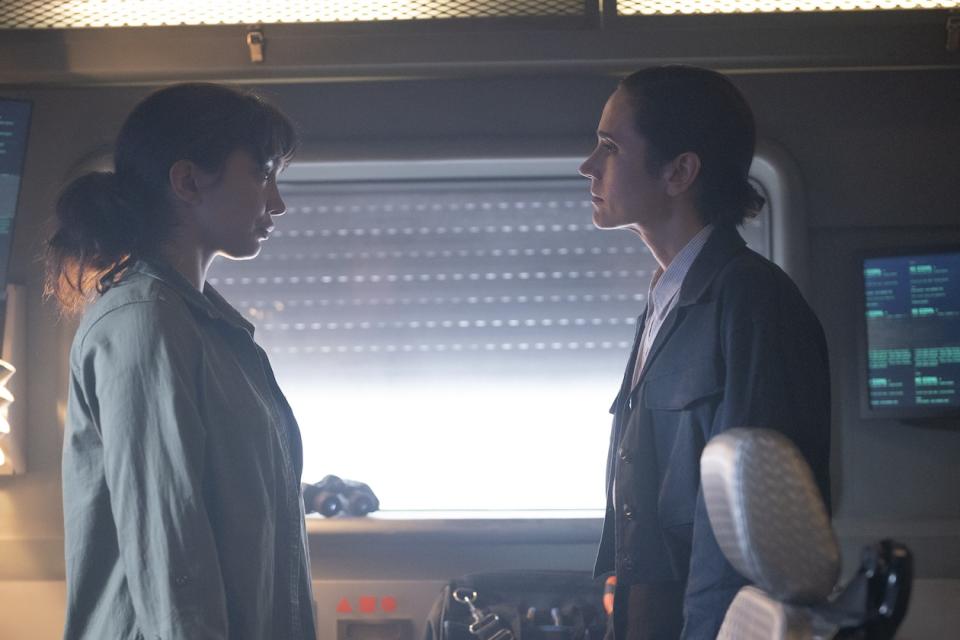Snowpiercer Boss Breaks Down Final Season’s Big Deaths, Shares the Story Behind Series Finale’s Powerful Duet
The following contains full spoilers for the Snowpiercer series finale, which aired Sept. 22 on AMC.
TV’s Snowpiercer has completed its final revolution.
More from TVLine
The TVLine-Up: What's Returning, New and Leaving the Week of Sept. 22
Grey's Boss Promises a 'Delightful and Fun' Arc Awaits Returning Doc
Frasier's Kelsey Grammer and EPs Explain His New Flirtation With Patricia Heaton's Holly - Watch
The four-season series, based on both the 2013 film directed by Bong Joon-ho and the 1982 French graphic novel Le Transperceneige by Jacques Lob, ended its run on Sunday with a finale in which Melanie (played by original cast member Jennifer Connelly) managed to make peer and baby daddy Nima (Michael Aronov) come to his senses. Alas, Nima had already set in motion the countdown for the Gemini rocket set to launch from a train car, so all anyone could do was watch it blast off into the night sky… and then peter out, all because Alex had earlier removed the bolts from its control panel.
As a result, the rocket’s innards were exposed to and frozen over by the outside air, leaving it to “deadstick” back to the surface and explode.
In the aftermath, Snowpiercer pulled up to New Eden, which all of the survivors would now call home.
TVLine spoke with Season 4 showrunner Paul Zbyszewski, who co-wrote the finale with Liam Fearnley, about finally getting this farewell run on track, the season’s saddest death and more.
TVLINE | Remind me, at the time you started on this season, did you know it was the final season, or did you have to pivot midway?
There was talk that, “Hey, maybe in success, we’ll see…,” but the sentiment was, yeah, this is most likely the last season. So in my mind, going forward and trying to plot out the season, I knew there was going to be a definitive end to it — and that was confirmed pretty early on.
TVLINE | What was your No. 1 mission when breaking what you felt would be the final season?
Oh my gosh, you just want to satisfy the fans’ expectations. You want to deliver something memorable, and meaningful, and something that has an emotional resonance to it. There are so many great artists, and creatives, and folks who worked on the show long before I came aboard, so I felt an obligation to try to not just pick up the baton, but make sure to win the race, to continue the metaphor.
TVLINE | Did any of the source material, namely the graphic novels, offer up ideas for ending this story?
Yes, the third graphic novel, Terminus, by Olivier Bocquet, had sort of a very definitive ending. And we definitely drew thematically from parts of that graphic novel. But that one was written in 2015, and a lot of the concept and tone and feel of our show came from the first two graphic novels, which were from 1982 and, I think, ’99, by Jacques Lob and Benjamin Legrand.
TVLINE | It looks like the second graphic novel, The Crossing, introduced the caterpillar treads, which Nima broke out to cross the frozen ocean in the series finale.
Yeah, there are visual effects shots of the train going across the open ice that we directly pull from the comic. Our fabulous VFX team, including Jeff Scott and Darren Bell, had a love for the show, and they knew the source material back and forth, so when I pulled panels from some of the comics and said, “I’d really like to try to touch on that,” they were all in, and they just did an incredible job visually. I think that the effects on the show are stunning.

TVLINE | Talk about casting the roles of Admiral Milius and Dr. Nima Rousseau for Season 4, what you needed from each of those actors.
We needed versatility. We needed folks who could give more than one layer to a character. Look, antagonists are the most fun to write, but they’re also really hard, because their motivations are usually pretty obvious, right? Like, they want power, or control. They’re driven by greed and anger, jealousy, vengeance, all that good stuff. And so, we tried to introduce these antagonists that weren’t that simple to pin down. Antagonists who initially presented one way, but then, as the layers started to get peeled, you realize they had real emotional/psychological issues that weren’t as easy to define or judge. And I thought both Clark [Gregg] and Michael [Aronov] delivered that to the nth degree. They were both phenomenal. I knew Clark could do it because I’d worked with him before [on Agents of SHIELD], but with Michael, he was a bit more of a wild card, because I met him through the casting process — all props to Wittney Horton, who brought him to our attention. I was like, “I recognize this guy from The Americans, but boy, he’s a lot different than I pictured…”
TVLINE | Give him that crazy scientist hair, and….
That was all him! I give him all the credit for that. It was over the pandemic that we were casting, and when I met over Zoom, he was wearing this white, button-down, collared shirt, and he had the hair, and the glasses. I was like, “Oh, what role are you coming off of? What are you dressed for?” And he’s like, “I’m dressed like Nima.” I was like, “Oh, OK! Cool.”

TVLINE | I might not have recognized him if I didn’t know that was him playing the role.
I saw snippets of him playing Rahm Emanuel in The Michelle Obama Story, and in the vignettes he was doing, he just looked so different, and sounded different. He came [as Nima] with this speech affect, he came with a physicality, he was very specific about what he wanted to wear. He built this thing in his head based on the scripts, and everyone was just wowed by him. And he’s a delight to work with, a lovely human being.
TVLINE | Was Nima being Alex’s biological father purely your invention, or did that come from any preexisting show bible?
No, it came from the writers room. One of the things that we spoke to the studio about early on, when we were plotting out the season arc, was we felt like it was important to look back, as well as forward — not just, “How are we going to get out of this?” but “How did we get here?” And not just on a character level, but a global level, a thematic level. Tying that backstory in, and understanding where Alex came from, the “nature versus nurture” of it…. We only get half the picture with Melanie. And I know that there were fan theories about maybe Wilford was the father, but that honestly felt unsatisfying to us in the writers room. So, we dared to take this swing, and it dovetailed really nicely into greater themes and stories about the world and people in general that we thought was really emotional, and that’s what we were going for, ultimately.

TVLINE | Speaking of Alex, Rowan Blanchard did a really nice job with the scene where Alex learns that Wilford died. You felt her going through every single emotion.
What was a luxury this cast is, they’re all all-stars. They’re all heavy hitters, and you don’t actually have to fill the page with dialogue for them to tell the story. You could give Jennifer [Connelly] nothing to do, you just tell her what Melanie is thinking, and you’d know the entire story based on her reaction face. That goes for the entire cast, but Rowan’s performance in that scene in particular, I agree. She did a fantastic job.
TVLINE | You killed off Zarah and then Ben, and among the bad guys, Wilford, Milius and Nima. Did anybody else almost not make it to the end?
I mean, sure. There were names kicked around a number of times for other folk, but at the end of the day, it’s like, “What has emotional resonance?” Character deaths should not be frivolous. They should not be tossed off like “shock for shock value.” If someone was going to die, it had to be about something emotional, something thematic, a comeuppance for somebody who had it coming. Those were very long discussions, and very heavy discussions, because especially in the case of Ben (played since the pilot by Iddo Goldberg). He’d been with the show since the very beginning and was a fan favorite, and I think Iddo did a phenomenal job on the show this season, and really made that death meaningful and powerful.

TVLINE | You know, one thing that kept hitting me as I was watching the final season was how much of this cast stuck around to the end. Not just major players, but so many of the fringe players — like the guy who plays Boki (Aleks Paunovic). Having that kind of continuity made such a difference.
I give credit to, obviously, production for helping us make that work, and getting actors to the set when maybe, necessarily, they weren’t available because they’re all in demand. And Aleks is a great example. He had a bunch of stuff going on, but he is a terrific actor and I always loved his performance, especially in Season 2. I wanted to bring him back, to do something that wasn’t “Monster Boki,” but to give him his humanity back, and I thought he did a great job.
And Mike O’Malley (who plays Roche), he was writing and running another show (Starz’s Heels) at the same time! But at the drop of a hat, he told me, “Dude, I’m there when you need me. Just give me a little bit of notice, and I’ll be on a plane.” And production made it work. Matthew and Holly, our line producers, are stellar creative partners, but their organization of a cast of this size of this cast, the logistics of getting people to the place where we need them to be, they just did a terrific job. And the actors wanted to be there. Even for the smaller roles, they all wanted to be there. They felt an emotional connection to the show, and they wanted to be there in the end. Karin Konoval, who plays Dr. Pelton, at one point told me, “Honestly, I didn’t think I’d make it to the end,” but she did, and I was really happy about that.
TVLINE | Toward the end of the finale, you had Layton leading a charge to storm the front of the train, just like back in the day. Were there any smaller callbacks that maybe people didn’t catch?
There were a bunch of Easter-eggy kind of things all along the way. There was one in particular that I enjoyed, in Episode 7, the scene with Layton and Wilford, and Wilford is dying from the poison cigar. One of his last lines is, “I love a good swashbuckler,” and that was a callback to the very first scene he had with Melanie back in Season 2, “The Time of Two Engines,” written by [former showrunner] Graeme [Manson]. It was just a little way of tipping my cap to him for creating such a wonderful character who provided such joy, and mischief. But also, there were little things, like partnering up Till and Oz again toward the end, where you were like, “Oh, I missed those guys together!”
Also, Till was in a standoff in the first season where she gets punched in the face and knocked out, but in the finale standoff, Till frees herself. She’s badass, gets out of it, and takes care of herself. There was a bit of a callback in that setup, too.
TVLINE | Talk about choosing the song that Lena Hall’s Audrey sang at the end…
That was “Everything Must Change,” and the version we covered was by, I believe, Nina Simone? We had a number of different songs that were bandied about, all of different tones. Some were a little sadder, more maudlin, and then some were more upbeat. Ultimately, Lena was the one who was like, “No, it’s this one. And I’ll kill it.” And she did. She put her heart and soul into that song. It was really moving on set just to hear her sing it, even rehearsing it with Sam [Otto, who plays Oz]. He really doesn’t get the credit for his voice, but holy cow. That was another bit of an Easter egg — like, we heard Sam sing before on the show, at the piano, but we intentionally held that moment back, of Lena and Sam singing together, for the end. I think that duet is just super-moving, and the cast and crew were all really touched.
TVLINE | Lastly, I know there was an offhanded line about this at the very end, but what does become of the Snowpiercer train now?
What becomes of the actual Snowpiercer train? That’s a good question. That will be for someone else to answer. Right now, it’s parked at New Eden, for all I know — until somebody else decides to take it out for a spin, and see what else is going on in the world.
Best of TVLine
Sign up for TVLine's Newsletter. For the latest news, follow us on Facebook, Twitter, and Instagram.

 Yahoo Lifestyle
Yahoo Lifestyle 
